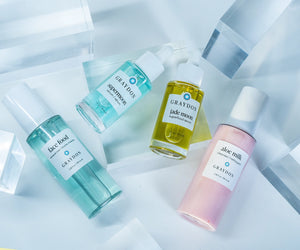Our skin constantly renews itself. If you’ve read up on cleansers or exfoliants, you know that they help get rid of dead skin cells… but how do these dead skin cells appear on the surface of your skin in the first place? Well, it’s a completely natural process called the skin cycle.
The skin cycle plays a big role in your skin’s health as you age. It’s also the reason why most experts will tell you that you have to wait at least 30 days to see long-term results from a new skincare product. But more on that later.
For now, let’s explore your skin cycle. I’ll define it, talk about the factors that cause it to slow down (hint from the title: one of them is aging), and share what skincare you can use to speed it up.
What is the Skin Cycle?
Put as simply as possible, the skin cycle is the process of new skin cells coming to the surface of the epidermis and replacing the dead skin cells at the top.

The epidermis, which is the topmost layer of the skin, cycles these new cells to the top of the skin’s surface (called the Stratum Corneum) so that they can eventually mature (and die) and join the skin barrier, where they work with the rest of the skin’s structure to lock in moisture and protect the skin from outer irritants like debris, pollution, and more.
Most will agree that the average skin cycle is about 30 days long, but many factors can speed or slow your cycle. In general, the faster your skin cycle, the better for your skin because new healthy cells are being generated and brought to the surface more frequently.
Other terms to know:
- Cellular Turnover: This is the speed at which your new skin cells come to the surface of your skin, whereas the skin cycle is a term for the entire process. If you see skincare products or ingredients promising to “increase cellular turnover”, they mean that your skin cycle will become shorter.
- Cell Renewal: This is an easy one. Cell renewal is just another way to say cellular turnover! It's another term to look for when exploring product and ingredient benefits.
What’s the Connection Between Your Skin Cycle and Aging?
You’ve probably put the dots together on this one by now—the skin cycle is something that naturally slows down as we age. Fresh skin cells take longer to come to the surface, which can lead to a number of things:
- Your skin is more likely to be dull due to dead skin cell build up
- This build up can also cause congestion and unwanted texture
- When your skin cycle is slower, more dead skin cells accumulate on the surface of your skin—this can cause your barrier to be disrupted, leaving your skin struggling to properly absorb any topical moisturization. AKA, you’ll deal with skin dryness
- This dryness can also make fine lines and wrinkles appear more pronounced than they actually are
If you’re curious about other aspects of skin aging, check out our article on inflammaging, which explores the link between age and increased skin inflammation/irritation.
We shared the “average” cycle above, but let’s look at how that tends to change based on our age:

There’s a range for each age group, one that gets bigger and bigger. That’s because there’s much more than just your age that affects your skin cycle. Other factors can be the difference between being on the low end of the range versus the high end.
Other Factors That Can Slow Your Skin Cycle

It’s not just age that affects your skin’s ability to renew itself. There are other factors, some of which you can even change now to help care for your skin! After all, topical products alone can’t beat a skin healthy lifestyle and an effective skincare routine. You deserve to take great care of yourself 🩵
Sun Exposure and UV Damage
UV damage can interrupt and slow your skin cycle. In relation to the skin cycle, UV rays specifically damage the DNA structure of your cells, which leads to the skin cycle actually stopping while the DNA is repaired.
In addition to disrupting your skin cycle, UV damage can also cause your collagen and elastin (which keep your skin firm and plump) to break down faster, another thing that happens naturally as you age but can be accelerated by damage.
Fun fact: Your skin sheds about 14 grams of dead skin every day.
Lifestyle Factors
Factors like a poor diet, poor sleep, smoking, and excessive alcohol consumption can have a negative impact on your skin cycle.
- For diet, if you’re lacking proper nutrition—particularly vitamins and antioxidants—it can hinder your skin’s ability to heal and renew itself.
- For sleep, this is a time your skin uses to renew itself, strengthen the skin barrier, and repair damage from the day. Missing out on that can impact your skin health.
- For smoking and excessive drinking, this can cause the skin to be inflamed, dehydrated, and damaged. The free radicals created from smoking in particular slow the skin cycle, as well as collagen and elastin production.
Hormonal Changes
Hormonal fluctuations, especially significant changes like perimenopause and menopause, can impact the skin cycle as they play a key role in regulating cell growth and development. Declining estrogen levels, for example, slow your cellular turnover.
On top of that, hormones already play a huge role in how your skin functions in general. Hormone changes can leave skin more fragile and dryer (because you are producing less sebum). This leaves your skin with a weaker defense system, leaving you more prone to flare ups if you have rosacea or eczema, as well as general inflammation and irritation.
Skincare to Speed Up Cellular Turnover
Now that I’ve talked plenty about what slows down cell renewal, let’s break down some of the products and ingredients that can help speed it up.
What type of products should I use?
There are two products that come to mind immediately because they’re meant to remove dead skin cells from the skin. These two are cleansers and exfoliators. However, reaping the benefits of particular ingredients for cell renewal can also be done using serums and other types of products.
But for now, let’s focus on cleansers and exfoliators:
Cleansers: Look, these don’t directly speed up cellular turnover. However, they clear away dirt, debris, and dead skin cells—this matters because it prepares the skin for other products with ingredients that do affect your skin cycle. It’s a vital first step in a skincare routine, one that allows for better absorption and penetration of things like serums and moisturizers with ingredients that boost cell renewal.
Exfoliators: These do have a direct impact on your skin cycle because they are specifically made to exfoliate away dead skin cells, revealing the healthy new ones underneath and encouraging more to come to the surface. You can exfoliate with physical exfoliants like a sponge or chemical exfoliants like AHAs, BHAs, and PHAs. It can also help prep skin for the products that go on after, offering better penetration and therefore efficacy of whatever you use next.

If you’re looking for something that cleanses and exfoliates, try out Face Foam Cleanser. The exfoliating willow bark extract and azelaic acid in the cleanser gently slough off dead skin cells and leave your skin clean but not stripped. It makes the perfect prep for other skincare products like toners, essences, serums, and moisturizers that follow—some of which might even contain their own cell renewal boosting ingredients.
What type of ingredients should I look for?
The good news is that you have plenty of options to choose from if you want to speed up cell turnover. Here’s a peek at some of my faves.
Retinols and Bio-retinols: Traditional retinols are known to speed up cell turnover. However, they can make your skin irritated and more photosensitive, so you might prefer a bio-retinol like bakuchiol or dew bean (also known as moth bean), both of which gently improve the appearance of fine lines and wrinkles, brighten, and help with acne. We include these in Supermoon Serum and Phyto Clear Gel Cream.
 Exfoliating Acids: Exfoliators were mentioned above because of their ability to encourage new skin cells by removing the old ones. Some exfoliating acids, in particular, are great at this. Try azelaic acid, which is antibacterial and anti-inflammatory, and willow bark extract, a less drying and more soothing alternative to popular exfoliant salicylic acid.
Exfoliating Acids: Exfoliators were mentioned above because of their ability to encourage new skin cells by removing the old ones. Some exfoliating acids, in particular, are great at this. Try azelaic acid, which is antibacterial and anti-inflammatory, and willow bark extract, a less drying and more soothing alternative to popular exfoliant salicylic acid.
Vitamin C and Botanical Vitamin C: Vitamin C is another fan fave amongst skincare enthusiasts. It brightens, offers antioxidant protection, helps with hyperpigmentation, boosts collagen and elastin production, and—of course—speeds up your skin cycle. Skin not a fan of traditional vitamin C? You can get vitamin C from a gentler, more stable source called THD (used in Moon Boost Serum) or from a botanical source like moringa (used in Supermoon Serum).
Consistency and Time are the Recipe for Skincare Success
When you use skincare products, especially ones like serums, you aren’t just taking care of the very surface of your skin. You’re also allowing these products to absorb deeper, working their magic (well—science) on your skin cells that are still en route to the top layer of your epidermis.
So no matter how fast or slow your skin cycle is, it’s important to remember that for all skincare, consistency is key… and sometimes you have to wait to see the fruits of your skincare labour. For example, if you’re in your 50s, you should use a product for at least 60-90 days to see its full capabilities.
While many products offer temporary benefits like plumping the skin when it’s dry or giving a short-term firming effect (which isn’t to say these benefits are bad), you see what your skincare is truly capable of when you give it time and consistency to work!



